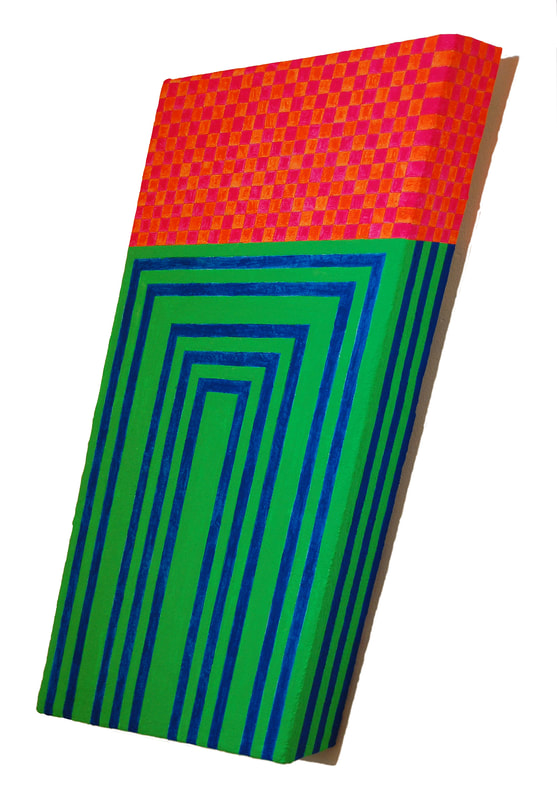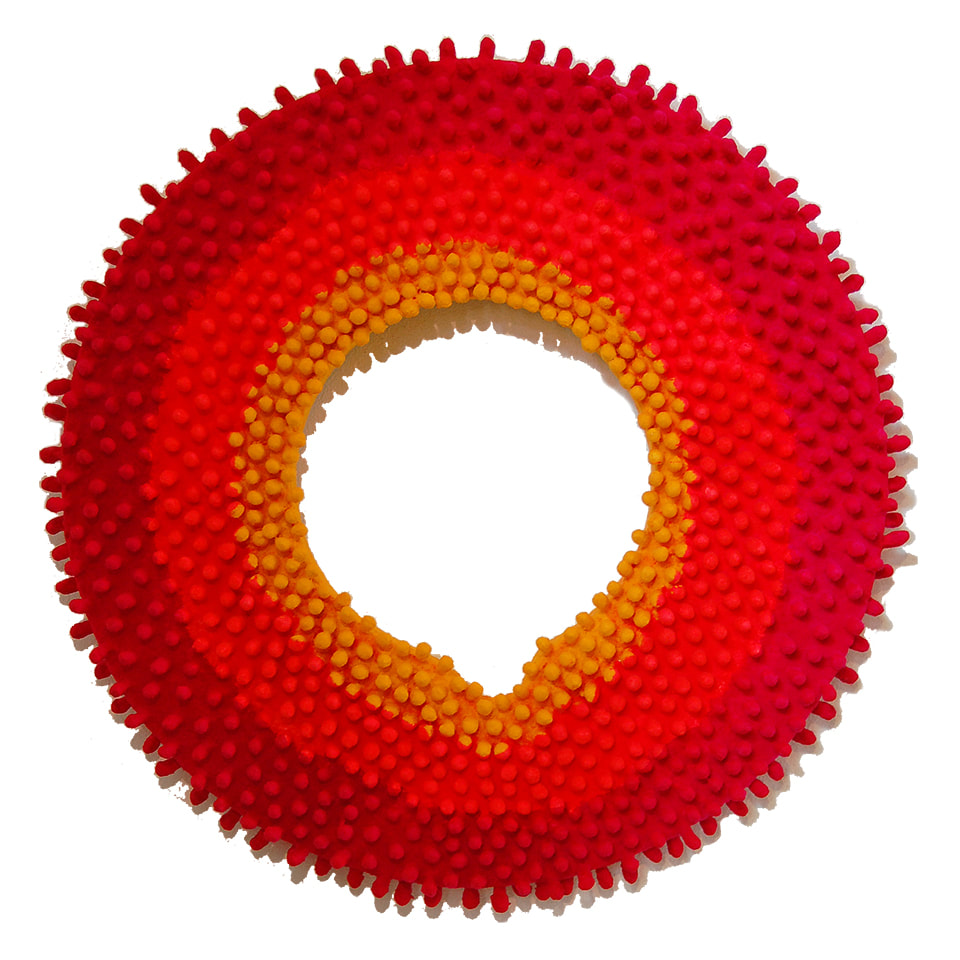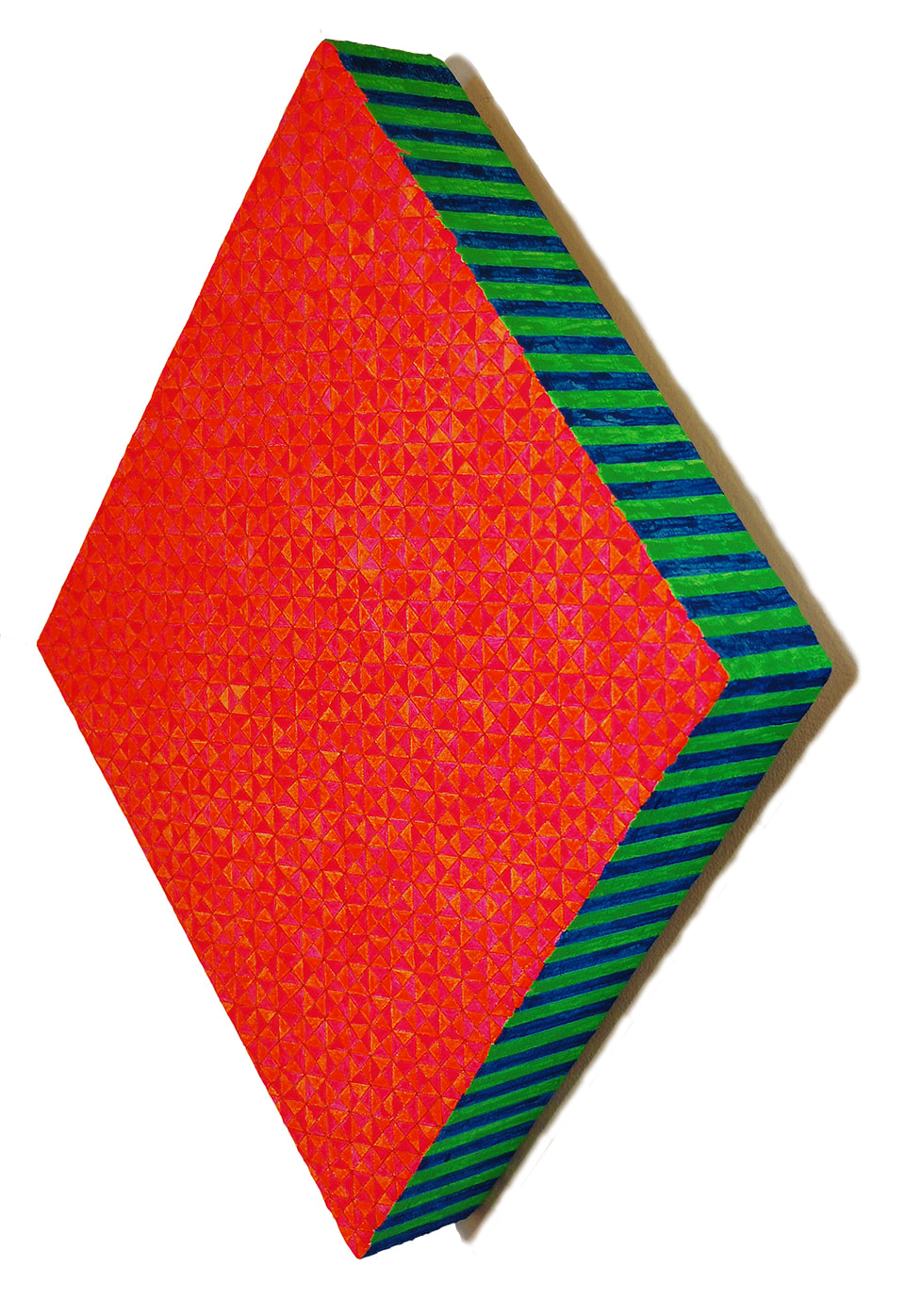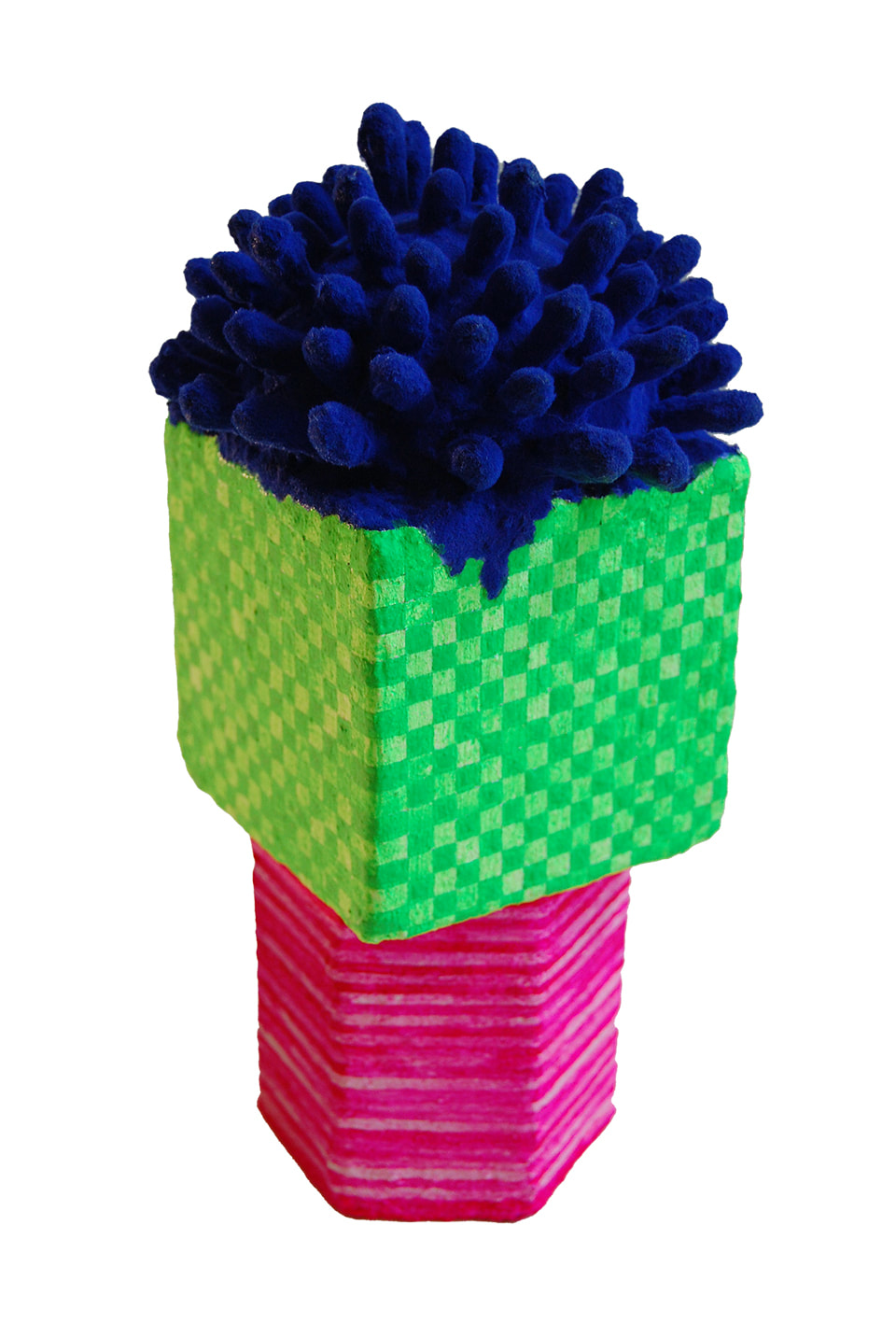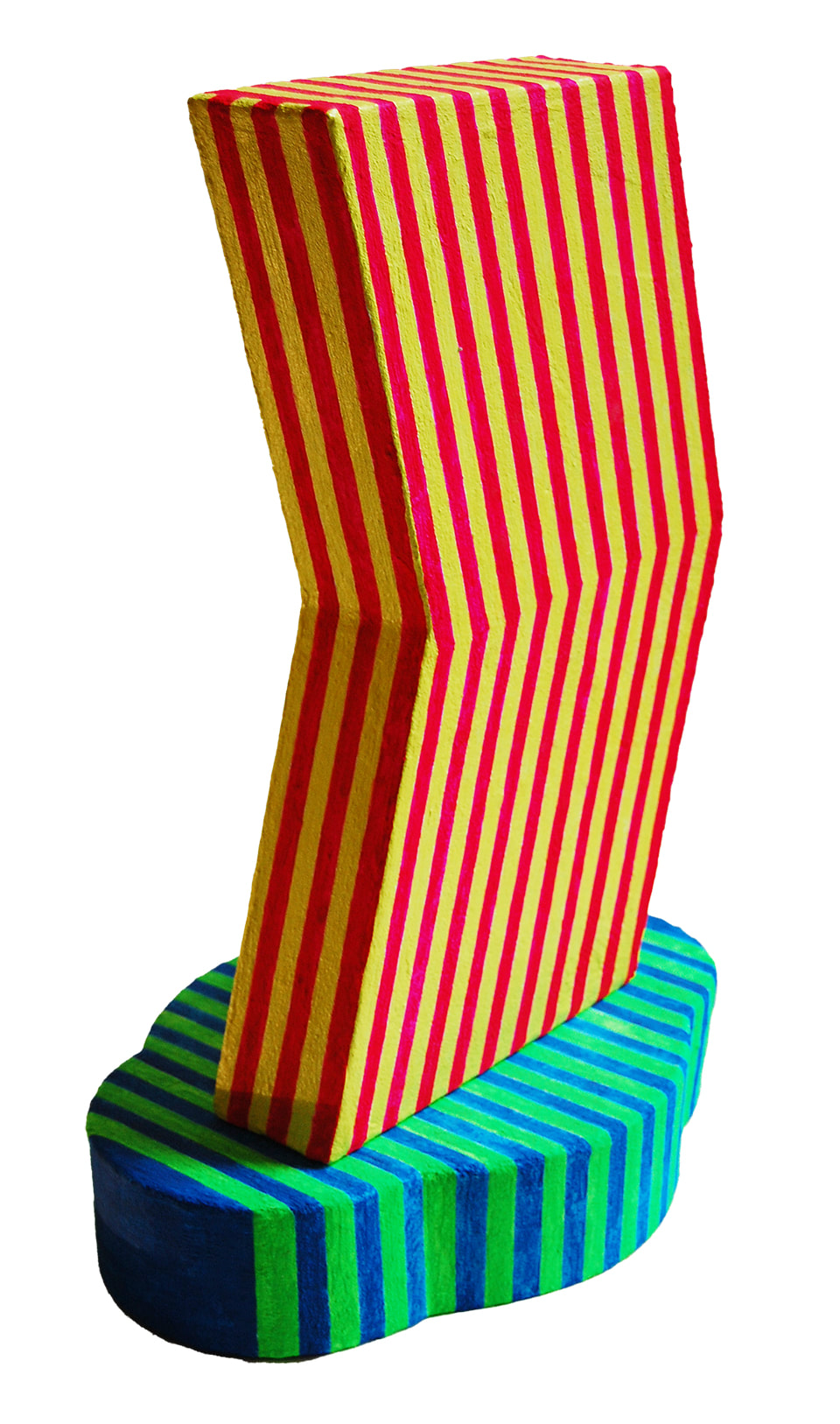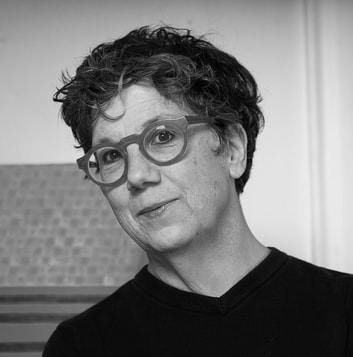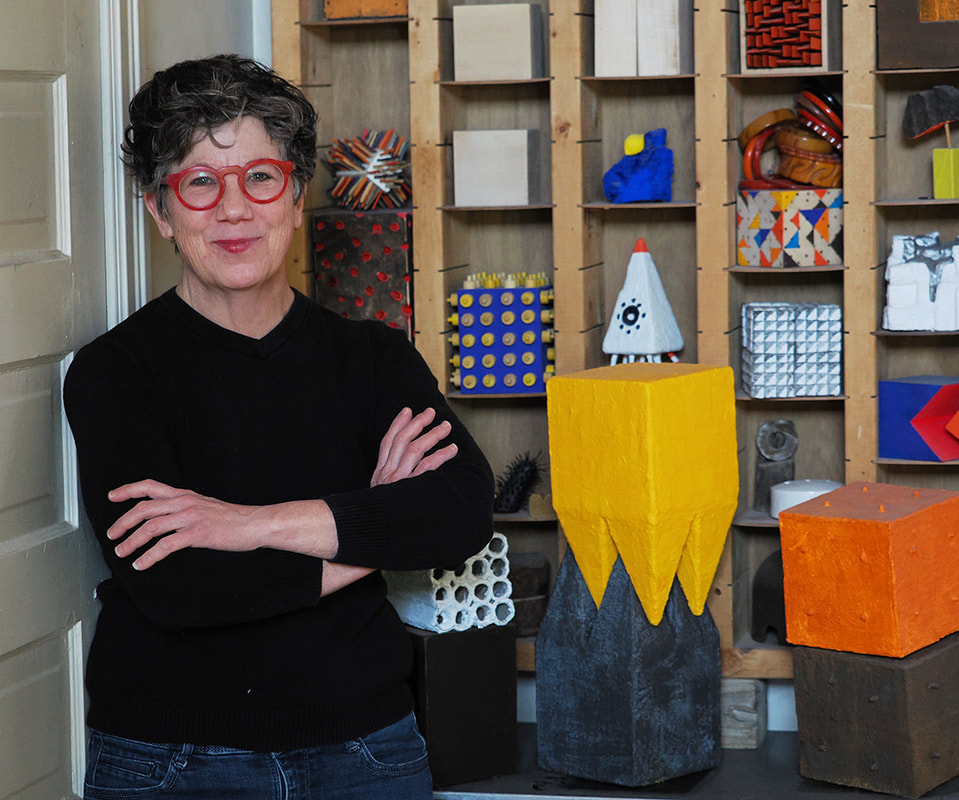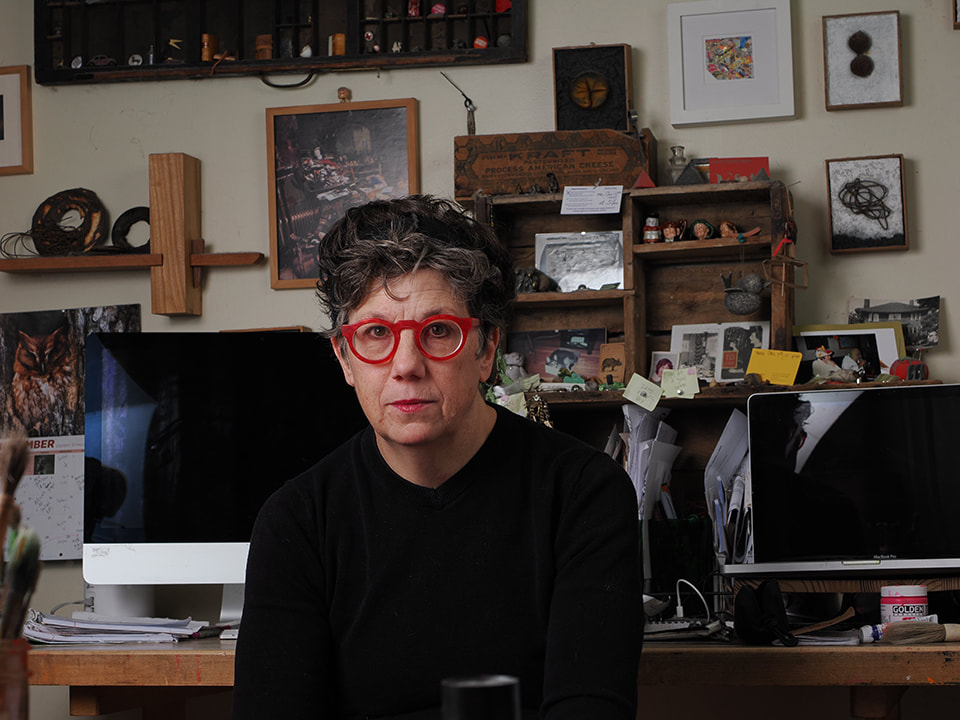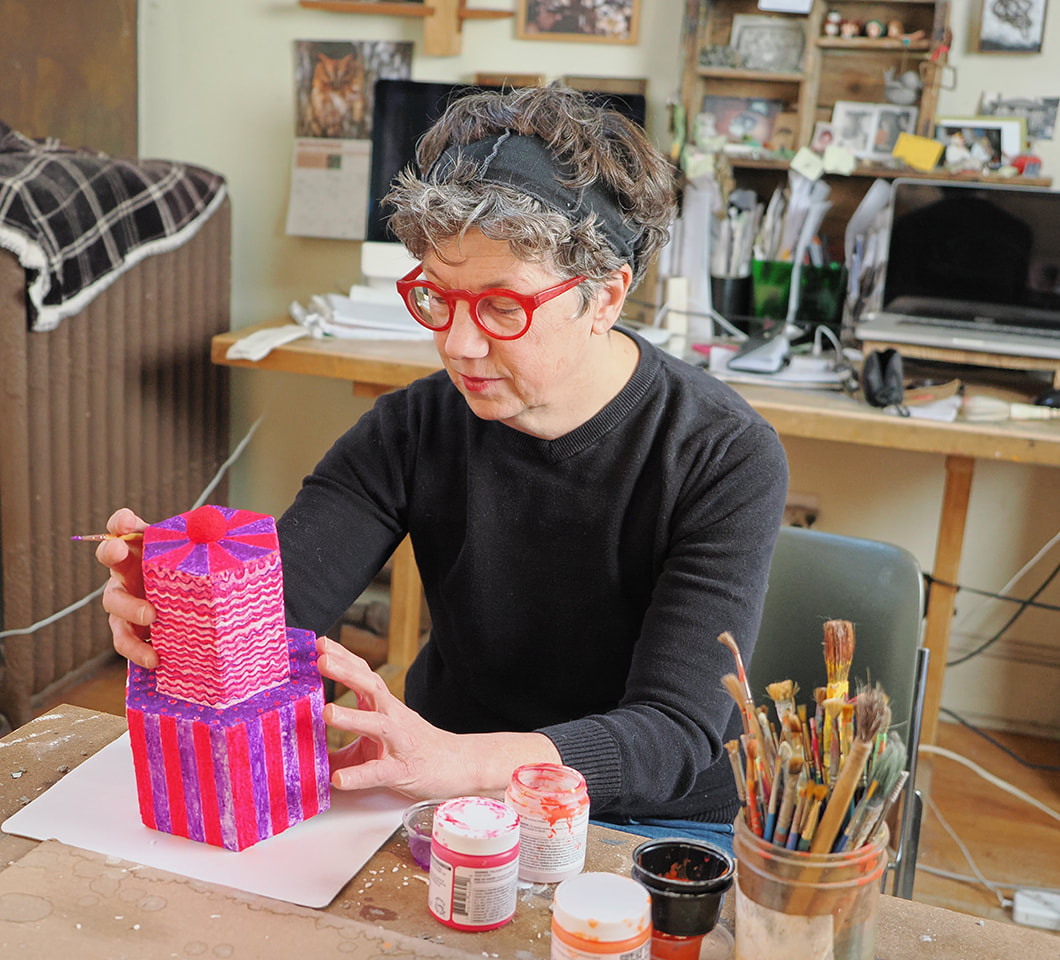Kim Matthews is an enthusiastic investigator of processes and materials, working in media from paper to wood. The frequent use of modular accretion to build her forms evolved from practical concerns—the need to be productive with little available studio time—and spiritual ones, as repetition is evocative of the mantra meditation that structures her daily life. She is currently working on two series: one consisting of idiosyncratic painted mixed-media sculptures informed by early pop-culture influences, and the other, a group of 108 small devotional drawings influenced by Tantric drawings of Rajasthan. While distinct, these bodies of work reflect interests in the tensions between the planned and the accidental, the geometric and the organic, and on the slow looking enabled by minute variations in pattern and texture. She has had a passion for beautifully made objects since early childhood, having spent formative years living in a historic home in midcoast Maine, where she spent summer days attending the auctions where her parents worked. "The objects of a civilization," she observes, "not only say we were here—they say we are here." The recipient of a 2010-2011 Jerome Fiber Artist Project Grant, Ms. Matthews exhibits throughout the US in public and private galleries and museums. In 2017, she participated in her first international exhibition in Ukraine. Her work is featured in Lark Books’ 500 Paper Objects and Artistry in Fiber, Volume II: Sculpture, published by Schiffer Books.
Published on April 23rd, 2021. Artist responses collected in months previous.
What hurdles have you overcome this year and how have they affected your art practice?
I don't know if I've actually overcome any hurdles, but there sure are some big ones out there. I feel like we're all fumbling along in this odd in-between space. The old world is ending and we don't know what will replace it. Some days I think it's nothing shy of miraculous when I can put one foot in front of the other and act as though I'm going to make it through this time. My art practice is its own thing. It comes from somewhere I can't explain. I guess the drawings maybe are some effort to overcome hurdles, since I started making them to deal with the profound pain of an abrupt breakup of a 20-year relationship that I thought would last forever. I'm just trying to make tools for my own survival and hope that they bring other people solace or joy, or even just a place to rest sometimes. But people are liking those drawings and I'm trusting the process and letting them emerge with minimal interference and with a sense of trust that they will get to the people who need them and nourish them in some way. It's been incredibly rewarding, actually.
How has your art practice been affected by the pandemic?
My art practice itself hasn't really been affected by the pandemic. I'm lucky that I still have a way to support myself, and I do all my work in my home studio, so I'm in my studio all day. So I'm surrounded by all my projects in process, and that's kind of a luxury to be able to periodically look at them and experience them as sort of a background process while I'm concentrating on the stuff that pays the bills. What's been affected by the pandemic isn't the production, but how to get the work out to people. I shipped work to a show only to have it sit in its box unopened and returned months later. I've got several pieces in a show in a shopping mall that got held over because the mall was closed because of COVID. And some shows went online. I used to swear I'd never participate in virtual exhibitions because my work is so tactile and has an energetic quality that I'm not sure comes across on line. Now there's no practical choice. The good news is, people are still getting something out of it. I never would have predicted that.
What support systems have you put in place to help keep your practice thriving amidst these unforeseeable circumstances?
I haven't put any new support systems in place. I'm very introverted and solitary anyway, and most of my friends are artists or musicians, so not much has changed in that regard. We're trying to brainstorm ways to get our work out, or to not lose our minds while we wait for the pandemic to end or the United States to explode or a miracle to happen—whichever comes first. I try very, very hard to be optimistic but not at the expense of honesty. Everyone I love is having a rough go. The more extraverted ones are climbing the walls. The others are freaking out about money or politics. But the extremity of the circumstances gives one a very potent sense of the fragility of life as well as a sense of what's important. Nothing matters but love. If we lose our compassion and our ability to honor the inherent dignity of all living beings, we're done for. I've experienced a lot of loss over the past several years and am trying to figure out how to move ahead as I age and things get weirder by the day.
What methods do you employ to stay resilient in your art practice? What tips would you recommend to other artists who find staying resilient difficult?
I'm not sure I understand this question. This life is not for everyone. If you don't believe an art practice is utterly necessary for your survival, there are probably many easier pursuits out there. The need to make art is an odd affliction. It's in your bones. But to stay resilient in life, I do my work; I meditate twice a day; I do yoga; I swim; I walk; I read; I listen to music all day long. And I try to limit my exposure to negative people and unwholesome situations. Of course rejection is hard. Of course running into the limits of your own talent or intellect is hard. Of course knowing that life is cruelly and painfully short is hard. But what we get to do is so beautiful and such a gift. We are fortunate to get to make art—incredibly fortunate. Having a sense of gratitude is vital.
What have you learned about yourself as an artist this year?
I've learned that I'm strong. I've learned that I have a pretty solid method for living that supports the things I'm trying to accomplish. I've learned that sometimes I take things too seriously and that assigning too much importance to a single pursuit can result in disaster. I'm working through lots of really, really old stuff and dealing with fear of inadequacy and getting more self-acceptance. The thing is, the more you understand about what good art really is, the more you have to confront the pain that you're that much further away from it. Dang this is hard. It's like, the more you know, the more you realize that you don't know anything. So then the job becomes doing the best you can at any given time with what you can bring to bear at that moment. There really isn't anything better than being able to make and appreciate art. It's the best life.
What hurdles have you overcome this year and how have they affected your art practice?
I don't know if I've actually overcome any hurdles, but there sure are some big ones out there. I feel like we're all fumbling along in this odd in-between space. The old world is ending and we don't know what will replace it. Some days I think it's nothing shy of miraculous when I can put one foot in front of the other and act as though I'm going to make it through this time. My art practice is its own thing. It comes from somewhere I can't explain. I guess the drawings maybe are some effort to overcome hurdles, since I started making them to deal with the profound pain of an abrupt breakup of a 20-year relationship that I thought would last forever. I'm just trying to make tools for my own survival and hope that they bring other people solace or joy, or even just a place to rest sometimes. But people are liking those drawings and I'm trusting the process and letting them emerge with minimal interference and with a sense of trust that they will get to the people who need them and nourish them in some way. It's been incredibly rewarding, actually.
How has your art practice been affected by the pandemic?
My art practice itself hasn't really been affected by the pandemic. I'm lucky that I still have a way to support myself, and I do all my work in my home studio, so I'm in my studio all day. So I'm surrounded by all my projects in process, and that's kind of a luxury to be able to periodically look at them and experience them as sort of a background process while I'm concentrating on the stuff that pays the bills. What's been affected by the pandemic isn't the production, but how to get the work out to people. I shipped work to a show only to have it sit in its box unopened and returned months later. I've got several pieces in a show in a shopping mall that got held over because the mall was closed because of COVID. And some shows went online. I used to swear I'd never participate in virtual exhibitions because my work is so tactile and has an energetic quality that I'm not sure comes across on line. Now there's no practical choice. The good news is, people are still getting something out of it. I never would have predicted that.
What support systems have you put in place to help keep your practice thriving amidst these unforeseeable circumstances?
I haven't put any new support systems in place. I'm very introverted and solitary anyway, and most of my friends are artists or musicians, so not much has changed in that regard. We're trying to brainstorm ways to get our work out, or to not lose our minds while we wait for the pandemic to end or the United States to explode or a miracle to happen—whichever comes first. I try very, very hard to be optimistic but not at the expense of honesty. Everyone I love is having a rough go. The more extraverted ones are climbing the walls. The others are freaking out about money or politics. But the extremity of the circumstances gives one a very potent sense of the fragility of life as well as a sense of what's important. Nothing matters but love. If we lose our compassion and our ability to honor the inherent dignity of all living beings, we're done for. I've experienced a lot of loss over the past several years and am trying to figure out how to move ahead as I age and things get weirder by the day.
What methods do you employ to stay resilient in your art practice? What tips would you recommend to other artists who find staying resilient difficult?
I'm not sure I understand this question. This life is not for everyone. If you don't believe an art practice is utterly necessary for your survival, there are probably many easier pursuits out there. The need to make art is an odd affliction. It's in your bones. But to stay resilient in life, I do my work; I meditate twice a day; I do yoga; I swim; I walk; I read; I listen to music all day long. And I try to limit my exposure to negative people and unwholesome situations. Of course rejection is hard. Of course running into the limits of your own talent or intellect is hard. Of course knowing that life is cruelly and painfully short is hard. But what we get to do is so beautiful and such a gift. We are fortunate to get to make art—incredibly fortunate. Having a sense of gratitude is vital.
What have you learned about yourself as an artist this year?
I've learned that I'm strong. I've learned that I have a pretty solid method for living that supports the things I'm trying to accomplish. I've learned that sometimes I take things too seriously and that assigning too much importance to a single pursuit can result in disaster. I'm working through lots of really, really old stuff and dealing with fear of inadequacy and getting more self-acceptance. The thing is, the more you understand about what good art really is, the more you have to confront the pain that you're that much further away from it. Dang this is hard. It's like, the more you know, the more you realize that you don't know anything. So then the job becomes doing the best you can at any given time with what you can bring to bear at that moment. There really isn't anything better than being able to make and appreciate art. It's the best life.
Find Kim Matthews on Instagram
